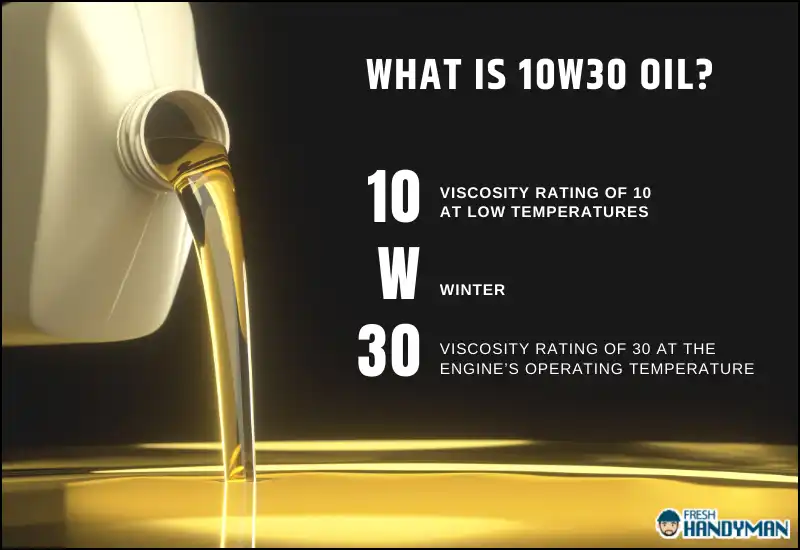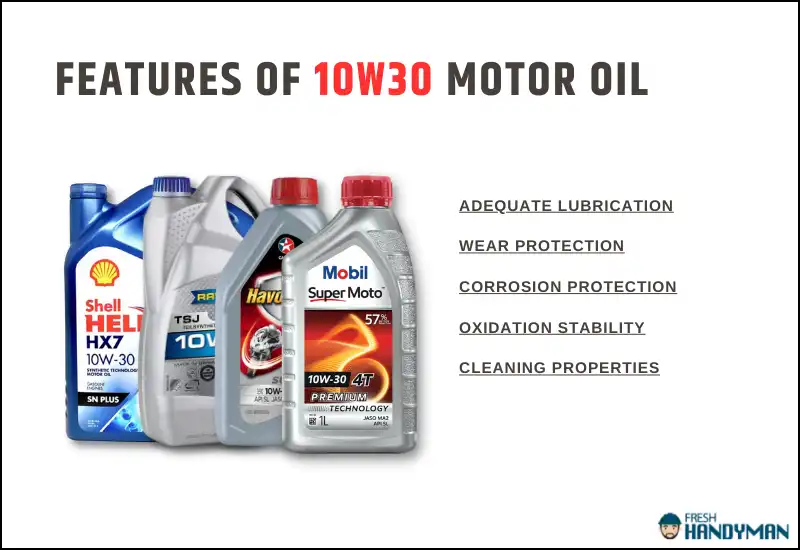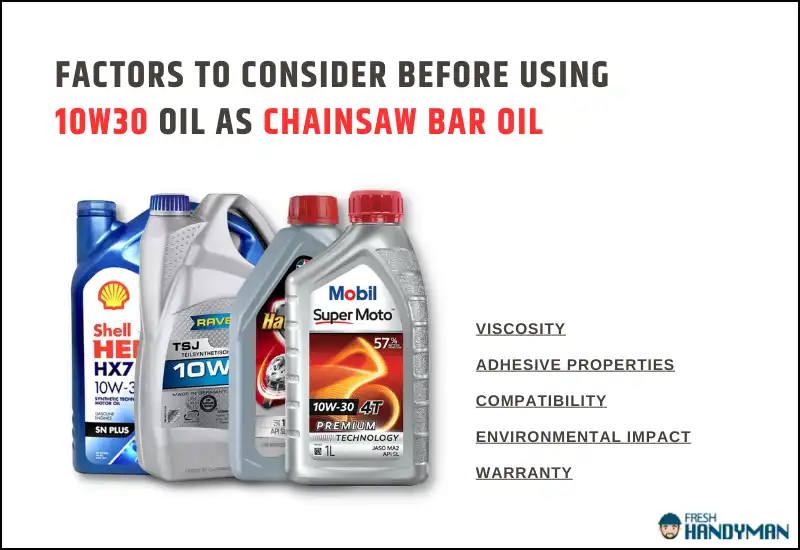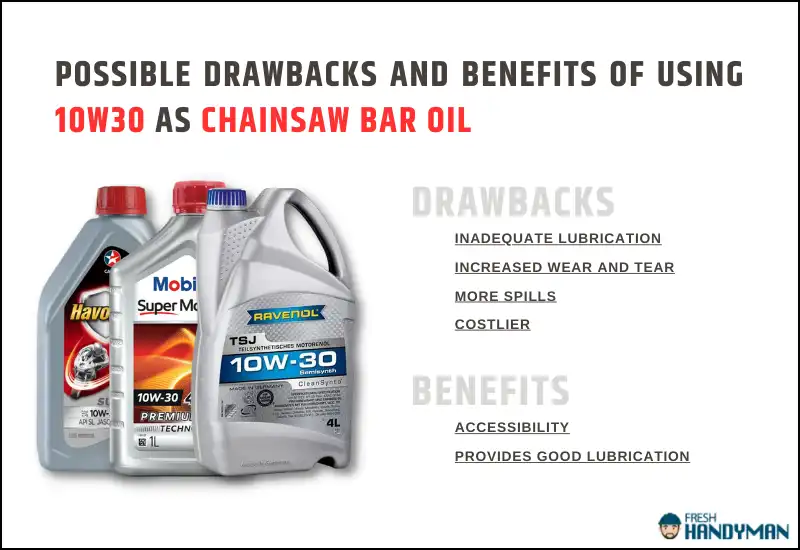If you’re a regular chainsaw user, you’ve probably run out of chainsaw bar oil several times. One question that undoubtedly crosses the mind is, “Can I use 10w30 for chainsaw bar oil?”
The answer is it depends. If it is an emergency and you can’t get chainsaw bar oil, for example, when cutting deep in the woods, you can use 10w30 temporarily. However, you should avoid it if you can easily access chainsaw bar oil.

10w30 oil has different characteristics than chainsaw bar oil; however, you can still use it as a substitute. It is less viscous and sticky but has good lubricating properties that will help to prevent your chainsaw from getting damaged.
Continue reading this article to learn more about the 10w30 oil and its suitability for chainsaw bar oil replacement.
What is 10w30 Oil?

10w30 oil is a multigrade motor oil formulated to provide lubrication over a wide range of temperatures and operating conditions. Multigrade oils have different SAE (Society of Automotive Engineers) viscosity grades and ratings at different temperatures.
When talking about 10w30, the “10w” indicates that the oil has a viscosity rating of 10 at low temperatures or cold weather conditions. The “w” stands for winter, while the “30” indicates that the oil has a viscosity rating of 30 at the engine’s operating temperature.
This means 10w30 motor oil becomes less viscous and thin enough to flow smoothly in cold weather. However, in hot weather, it thickens up and becomes more viscous to provide sufficient lubrication without breaking down.
Read Also: Top 3 Best Arborist Chainsaws
Features of 10w30 Motor Oil
The 10w30 motor oil is designed to provide consistent lubrication over a wide range of temperatures and operating conditions. Here are some of its key features:

1. Adequate Lubrication
As I mentioned earlier, 10w30 provides sufficient lubrication to ensure your engine operates in top-notch condition. Depending on the operating temperature, its varying viscosity also ensures the saw doesn’t produce too much noise.
2. Wear Protection
10w30 oil has additives that protect against wear and tear. This helps to increase the lifespan of the engine or other components that you’re using it for. It also helps to reduce the need for costly repairs.
3. Corrosion Protection
This motor oil also contains well-balanced additives that help to minimize corrosion and rusting. This feature is useful mainly if you operate the saw in humid or damp environments.
4. Oxidation Stability
10w30 hardly breaks down at high temperatures due to its good oxidation stability. This helps it provide lubrication even at high operating temperatures, thus increasing fuel efficiency.
5. Cleaning Properties
Finally, 10w30 has active cleaning agents that help to prevent the buildup of sludge or other deposits that might damage your engine or chain over time.
Read Also: The Best Chainsaw for Milling Lumber
How Does 10w30 Compare With Other Motor Oils?

Comparing 10w30 to motor oil with a lower viscosity, such as the 5w30, 5w30 will perform better at lower temperatures since it is slightly thinner. This also means that 5w30 consumes fuel at a respectable rate compared to 10w30. However, in hot operating conditions, 10w30 outdoes the 5w30.
On the other hand, if you compare 10w30 to motor oil with a higher viscosity, such as the 10w40, the 10w40 will make a better choice for use in high operating temperature conditions because it adheres to the bar or chain much better. The 10w40 also provides better protection against wear and tear.
However, 10w40 might get thick or sticky enough to provide lubrication at low temperatures. This can make it easier to operate the saw in colder climates.
How Does 10w30 Oil Compare to Chainsaw Bar Oil?

To start with, chainsaw bar oil is usually thicker than 10w30 oil. This means that it lubricates the bar better. It also means it will provide much better protection against damage than chainsaw bar oil by preventing sawdust and other debris from clogging the bar and chain.
The 10w30 oil, on the other hand, is slightly thinner than the chainsaw bar oil. It was designed to reduce friction and provide greater fuel efficiency.
Secondly, chainsaw bar oil has far better adhesive properties compared to 10w3o oil. Chainsaw bar oil has tackifiers that enable it to stick to the bar even when operating at high speeds or temperatures.
The 10w30 motor oil was designed to provide lubrication for engine parts, so it lacks this property. This means the chainsaw bar oil offers better protection when you use the chainsaw for extended periods.
The chainsaw bar oil performs much better when it comes to protection against wear and tear on the bar and chain. The 10w30 also helps to reduce wear and tear, but not to the extent the chainsaw bar oil does since it was solely designed for this purpose.
From an environmental conservation perspective, I would advise you to stick to the chainsaw bar oil because it is biodegradable. 10w30 oil was only formulated with performance and fuel efficiency in mind, so it may harm the environment more when it spills off the bar and chain.
Read Also: Stihl MS 180 Chain Oil Adjustment
Can You Use 10w30 Oil as Chainsaw Bar Oil?

Yes, using 10w3o as a substitute for chainsaw bar oil is possible. However, it is usually not recommended for long-term use. Chainsaw bar oil is specifically tailored to provide superior lubrication and protection to the chainsaw bar and chain.
The 10w30 oil, on the other hand, has been designed to provide lubrication for engines over a wide range of temperatures. While it may not be the ideal choice for chainsaw bar oil, it is still the closest replacement motor oil you will get.
Factors to Consider Before Using 10w30 Oil as Chainsaw Bar Oil

Here are some of the factors that you should keep in mind before substituting chainsaw bar oil with 10w30 oil:
1. Viscosity
It is important to note that chainsaw bar oil has a higher viscosity rating than 10w30. This thickness helps it properly coat the chainsaw bar and chain for efficient chain rotation. It also provides better protection against damage. However, the 10w30 is a multigrade motor oil, so it will work fine for your chainsaw in different climates.
2. Adhesive Properties
You will not be able to achieve the same level of adhesion when you substitute chainsaw bar oil with 10w30 oil since they have different adhesive properties. Chainsaw bar oil has additives that make it adhere to the bar better. Be prepared for more oil flinging of the bar when you operate it.
3. Compatibility
Before using 10w30 oil as a substitute for chainsaw bar oil, it is essential to check the owner’s manual to ensure the oil is compatible with your chainsaw. This is because some chainsaw manufacturers recommend specific types of oil for lubricating their chainsaws.
4. Environmental Impact
It would be best to consider the environmental impact before substituting chainsaw bar oil with 10w30 oil. Chainsaw bar oil is not bad for the environment since it can be broken down easily. Conversely, synthetic oil is not that environmentally friendly.
However, since 10w30 oil is made from synthetic base oils, it does not harm the environment as much as conventional oils do.
5. Warranty
Many manufacturers recommend a specific bar oil because it has suitable lubricating and protective properties. So, using a chainsaw bar oil other than the one recommended by your manufacturer might void your warranty.
Possible Drawbacks and Benefits of Using 10w30 as Chainsaw Bar Oil

I have used 10w30 as a substitute for chainsaw bar oil several times. Here are some of the drawbacks and benefits that I found:
Drawbacks
1. Inadequate Lubrication: 10w30 does not provide the same level of lubrication that the chainsaw bar oil offers, especially in high temperatures. If you are stuck, it might get the job done, but it doesn’t cover the bar for the same amount of time the chainsaw bar oil does.
2. Increased Wear and Tear: Wear and tear are always bound to happen when using anything other than chainsaw bar oil. This is because chainsaw bar oil is thicker and more consistent. 10w30 oil is not as viscous and doesn’t provide the same level of protection as chainsaw bar oil.
3. More Spills: Chainsaw bar oil has tackifiers that make it cling to the bar even when the speed is high. 10w30, on the other hand, does not, so you are bound to notice more oil spilling everywhere if you use it.
4. Costlier: Motor oils are generally more expensive than bar oils, so you must dig deeper into your pockets if you replace chainsaw bar oil with 10w30 oil.
Benefits
1. Accessibility: 10w30 is way more accessible compared to chainsaw bar oil. This is because it is used by different types of equipment, including cars, lawnmowers, and bikes.
2. Provides Good Lubrication: 10w30 provides consistent lubrication since it has different viscosities at different temperatures. This makes it flow more in cold weather and thicker in hot weather.
FAQS
Can I use 10w30 for chainsaw bar oil?
Yes, you can. However, you should use it temporarily because it might increase wear and tear on the chainsaw chain and bar.
Will using 10w30 oil for chainsaw bar oil save me money?
No, using the 10w30 instead of the chainsaw bar oil will not save you money. This is because 10w30 is more expensive than chainsaw bar oil. On top of that, 10w30 is consumed faster than chainsaw bar oil, so you will end up refueling more often, which will also cost you.
Final Thoughts
“Can I Use 10w30 for chainsaw bar oil?” has been a topic that has generated a lot of debate among professional and regular chainsaw users alike. While some argue that it may work as well as chainsaw bar oil, others caution that it might damage your chain and bar due to increased friction.
As I have explained in this article, these two lubricants are different. One is designed specifically for chainsaw chains and bars, while the other is designed for engines. From experience, I have used 10w30 for chainsaw bar oil, but only for a short period.
The best way to ensure optimal performance and longevity of your chainsaw is to use the chainsaw bar oil recommended by your manufacturer.
Read Also:
